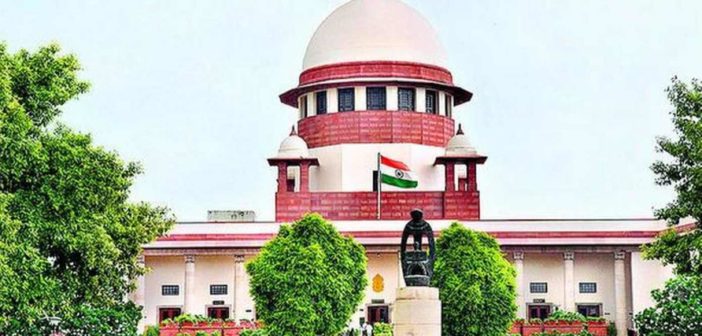In this edition of Court judgments review, we look at the Supreme Court’s judgements on Governor’s power with respect to Bills passed; power of lower courts to strike down subordinate legislation, and eviction order against son from elderly parent’s property; Kerala High Court’s decision to grant bail to an elderly for allegedly stabbing his wife and Punjab and Haryana High Court’s decision regarding electric connection as a fundamental right.
Supreme Court: Governor exercises all his powers and functions conferred on him by or under the Constitution on the aid and advice of his Council of Ministers
In a landmark judgement, the Supreme Court, in the State of Tamil Nadu vs. The Governor of Tamil Nadu and Anr, held that neither the concept of ‘pocket veto’ nor that of ‘absolute veto’ finds place within the constitutional scheme and mechanism envisaged under Article 200 of the Constitution, and as the general rule, the Governor in exercise of his functions under Article 200
The Supreme Court was hearing a petition filed by the State of Tamil Nadu, which raised concerns over the prolonged inaction of the Governor on several matters of significant public interest. These included delays in granting assent to bills passed by the State Legislature, approvals for prosecuting public servants, permissions to investigate corruption cases involving moral turpitude, premature release of prisoners, and appointments to the Tamil Nadu Public Service Commission.
Out of 12 bills submitted to the Governor for assent, 10 were returned, and 2 were referred to the President of India. When the Legislative Assembly re-passed the same 10 bills and resubmitted them, the Governor once again reserved them for the President’s consideration, citing that they dealt with subjects beyond the State’s legislative competence. Following a meeting between the Governor and the Chief Minister intended to resolve the deadlock, it was noted that assent was granted to one bill, seven were withheld, and two remained pending.
After hearing arguments from both sides, the Court framed the following key issues for determination:
- What options are available to the Governor while exercising powers under Article 200 of the Constitution?
- Can the Governor reserve a bill for the President’s consideration at the stage of reconsideration by the Assembly, especially if the bill was not reserved earlier and was initially withheld?
- Does the Constitution prescribe a specific timeframe within which the Governor must act under Article 200?
- Is the Governor bound to act solely on the aid and advice of the State Council of Ministers under Article 200, or does the constitutional framework allow him some discretion?
- Is the Governor’s exercise of discretion under Article 200 subject to judicial review? If so, what are the standards for such review?
- Once a bill is reserved for consideration under Article 200, what is the constitutional process for the President to act under Article 201?
On the issue of the course of action available to the Governor,
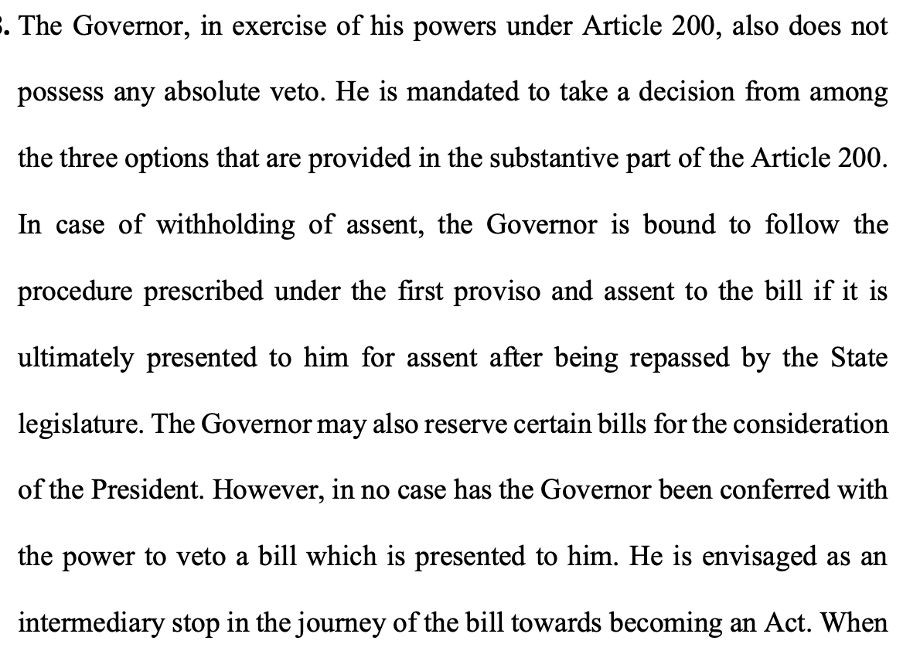
Regarding the issue of time-limits for Governors to act on bills, the Supreme Court observed that any intentional delay by a Governor—either in granting assent or in reserving a bill for the President’s consideration—must be seen as a serious threat to the federal structure of the nation. State governments cannot be left helpless, indefinitely awaiting action from the Governor. Since the inaction of constitutional authorities is subject to judicial scrutiny, it becomes essential to establish clear and reasonable standards to assess such delays. In this context, timelines set by the courts play a crucial role in ensuring accountability and justiciability.
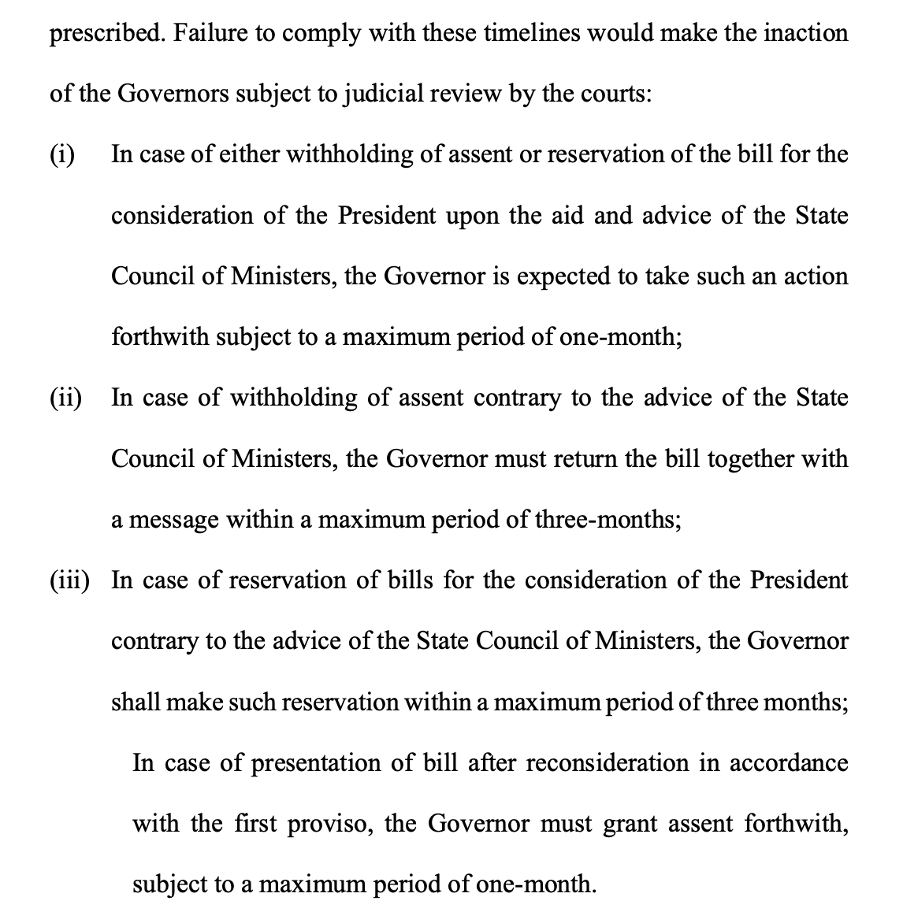
On whether the Governor has any discretion apart from acting on the aid and advice of the Council of Ministers, the Supreme Court held that, barring exceptional cases, the Governor has to mandatorily abide by the advice tendered by the Council of Ministers.
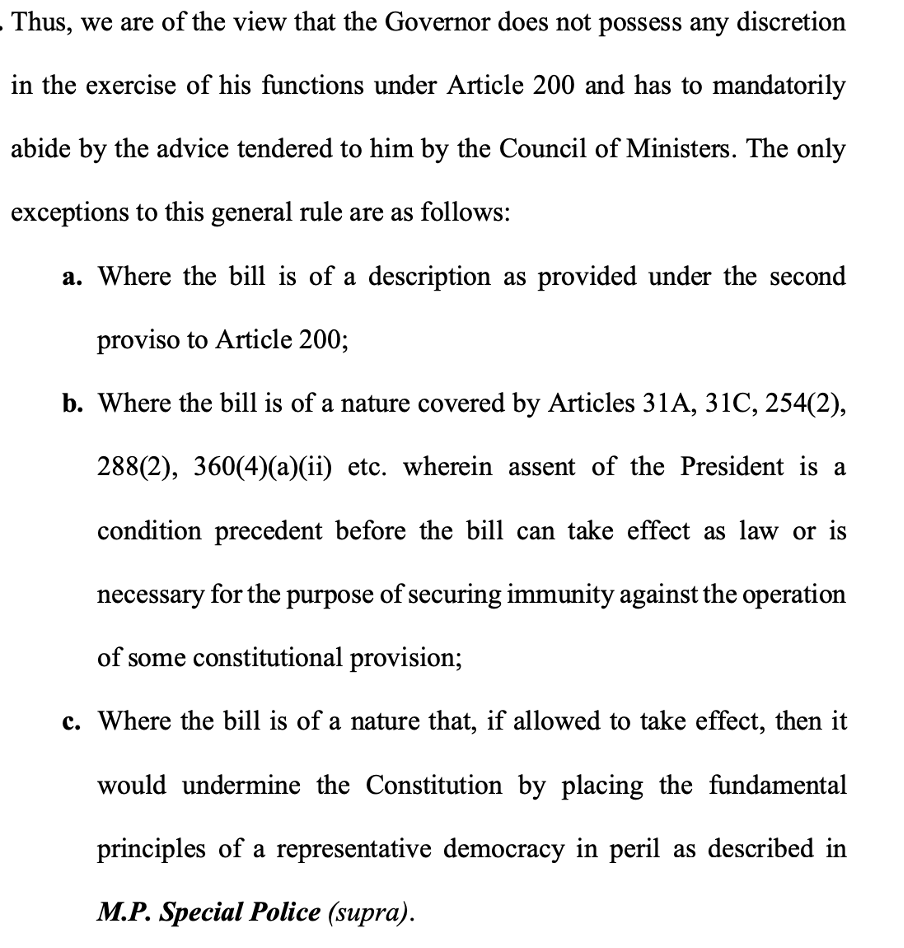
On the question of whether the Governor’s actions are subject to judicial review, the Supreme Court clarified that no constitutional authority is beyond the scope of such review. It found no justification for exempting the functions performed by the Governor or the President under Articles 200 and 201 of the Constitution.
In its concluding observations, the Court emphasized that individuals holding high constitutional offices must be guided by the foundational values of the Constitution. These values, deeply cherished by the people of India, are the outcome of decades of struggle and sacrifice by the nation’s forebears. When making decisions, such authorities must resist transient political pressures and instead uphold the constitutional spirit. Any deliberate attempt to sidestep constitutional responsibilities amounts to undermining the very principles on which the nation is built. The Court expressed hope that the Governor and the State Government would work together in harmony, with the welfare and interests of the people as their foremost priority.
Accordingly, the writ petition has been disposed of, and the Registry is instructed to forward a copy of this judgment to all High Courts and to the Principal Secretaries to the Governors of all States.
Supreme Court: Writ Courts possess the authority to Suo Motu strike down subordinate legislation that violates fundamental rights or is contrary to binding judicial precedents.
The Apex Court, in Bihar Rajya Dafadar Chaukidar Panchayat (Magadh Division) vs. State of Bihar and Others, held that it is not only the duty of the writ courts in the country to enforce Fundamental Rights of individuals, who approach them, but it is equally the duty of the writ courts to guard against breach of Fundamental Rights of others by the three organs of the State. It is the duty of the writ courts to deliver justice by declaring the subordinate legislation void to safeguard the rights of others who might not have been affected thereby. However, it can only be done rarely and in cases which stand out from the ordinary.
The case concerned a challenge brought before the apex court by the Bihar Rajya Dafadar Chaukidar Panchayat (Magadh Division) against a decision of the Patna High Court, which had invalidated a controversial provision of the Bihar Chaukidari Cadre (Amendment) Rules, 2014. The contentious rule enabled retiring chowkidars to nominate their dependent relatives for appointment in their place, effectively introducing an element of hereditary succession into public employment. Although the constitutional validity of this rule had not been formally contested before the High Court, it took cognizance of the issue and proceeded to strike it down, citing violations of Articles 14 and 16 of the Constitution.
The Supreme Court upheld the High Court’s decision, reiterating two settled propositions of constitutional law: first, that equality of opportunity in public employment is a fundamental guarantee under Article 16; and second, that any law permitting entry into public service without ensuring such equal opportunity is constitutionally untenable unless it is backed by a valid and reasonable classification.
The Court further noted that hereditary appointments to public posts have consistently been disapproved of in constitutional jurisprudence. It recalled earlier precedents where laws enabling such appointments had been struck down or repealed, reinforcing the principle that public office cannot be treated as a family entitlement.
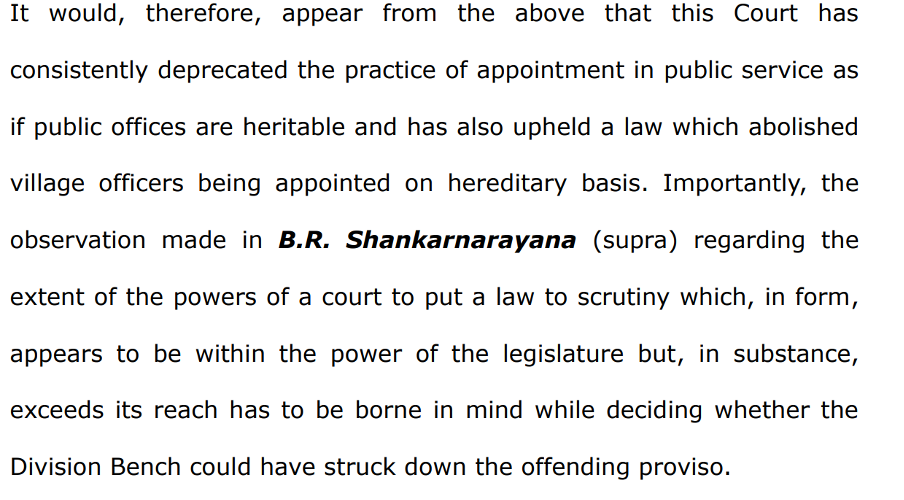
The appellant before the Supreme Court contended that the Patna High Court had overstepped its jurisdiction by addressing an issue that had not been formally raised before it. However, the Supreme Court rejected this argument, affirming that the High Court was fully within its powers under Article 226 to act suo motu and invalidate a provision that was manifestly unconstitutional.
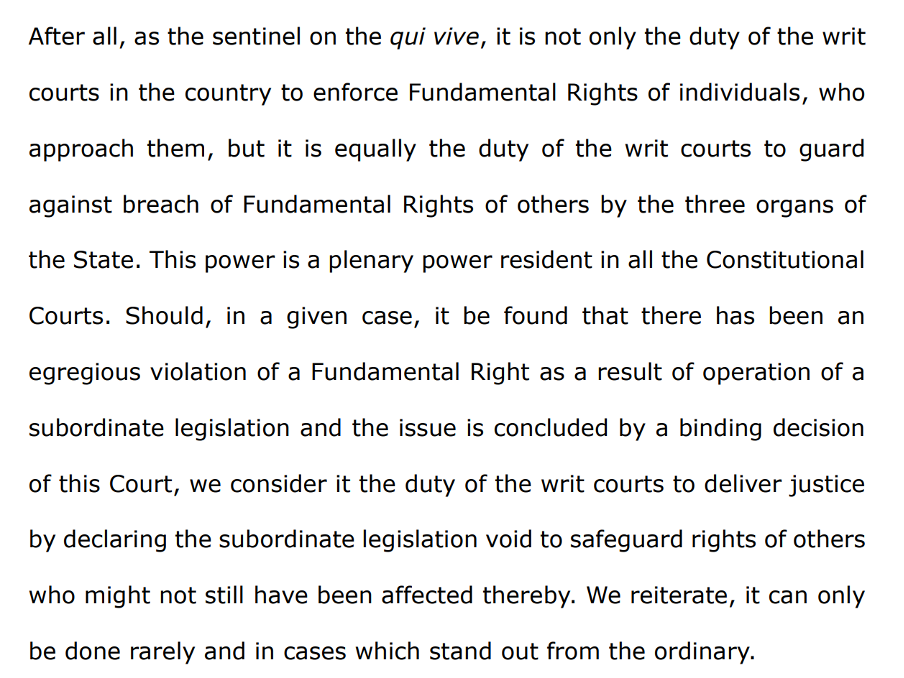
The Court further elaborated on the concept of inherent powers, which are intrinsic to all courts, particularly those of superior jurisdiction. These powers do not derive from legislation but are embedded in the very nature and structure of the judicial system. Inherent powers enable courts to maintain their dignity, ensure compliance with their orders, protect their officers from misconduct, and address improper conduct. The Court emphasized that such inherent powers are vital for the effective and orderly functioning of the justice system. Moreover, these powers may be exercised not only to uphold procedural integrity but also to ensure that justice is done in each case.
Accordingly, the Apex Court held that the Judgement of the Division bench of the High Court does not warrant any interference.
Supreme Court: Tribunal may have authority to order an eviction, if it is necessary and expedient to ensure the maintenance and protection of the senior citizen or parent.
The Supreme Court, in Rajeswar Prasad Roy vs. The State of Bihar & Ors, held that the Maintenance Tribunal under the Maintenance and Welfare of Parents and Senior Citizens Act, 2007, has the authority to order eviction to ensure the maintenance and protection of the senior citizens.
The brief facts of the case are as follows. The case arose from a dispute involving a 75-year-old retired Junior Engineer of the Bihar State Housing Board, who owned a self-acquired property in Lohia Nagar, Patna. To supplement his pension, he had developed 20 rooms on the premises and operated them as “Preeti Rest House.” Following marital discord and strained family relations, his third son and daughter-in-law forcibly occupied three rooms on the property and allegedly threatened him with false criminal cases, besides creating disturbances for other tenants.
The Appellant approached the Maintenance Tribunal seeking eviction of his son and daughter-in-law. The Tribunal, acknowledging his vulnerability and the unlawful occupation, passed an eviction order in April 2022. The order was upheld by a Single Judge of the Patna High Court when it was challenged.
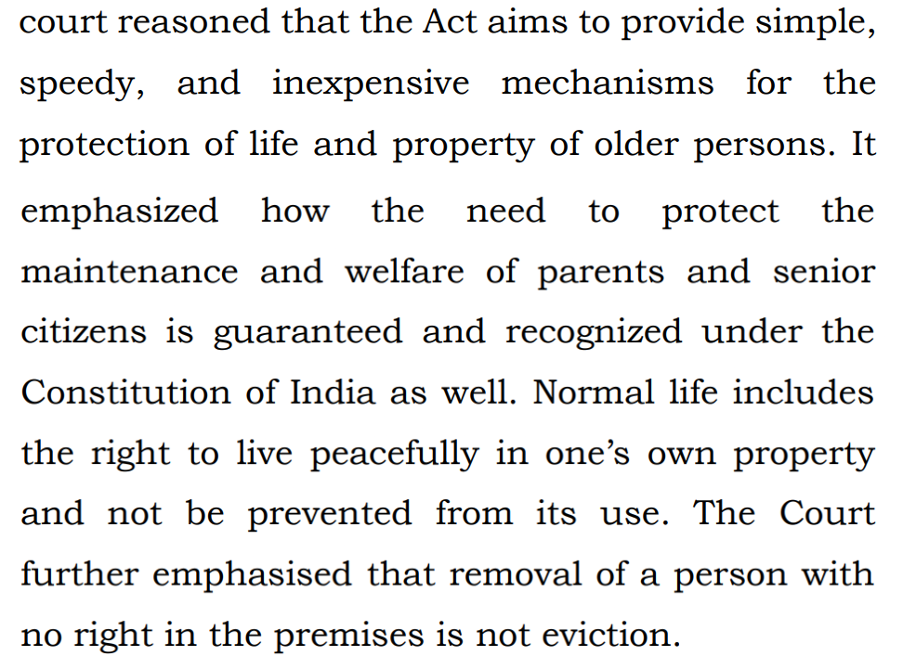
However, in a Letters Patent Appeal, the Division Bench reversed the decision, stating that eviction could not be ordered under Section 23(1) of the Act in the absence of a specific maintenance claim, and remanded the case for the determination of reasonable rent, and allowed the Appellant the option to pursue eviction through Civil Court.
The Apex Court, placing reliance on S Vanitha vs. Deputy Commissioner Bengaluru Urban District & Ors, overturned the Division Bench’s decision and reinstated the Tribunal’s eviction order. It held that the Appellant’s title over the subject property was well established as self-acquired and not ancestral, contrary to the Respondents’ claim. Further, the behaviour of the son and daughter-in-law amounted to harassment and warranted protection under the Act. Also, Rule 21(2)(i) of the Bihar Senior Citizens Rules, 2012 provides that it is the duty of the District Magistrate to ensure that the life and property of the senior citizens are protected and they are able to live with security and dignity.
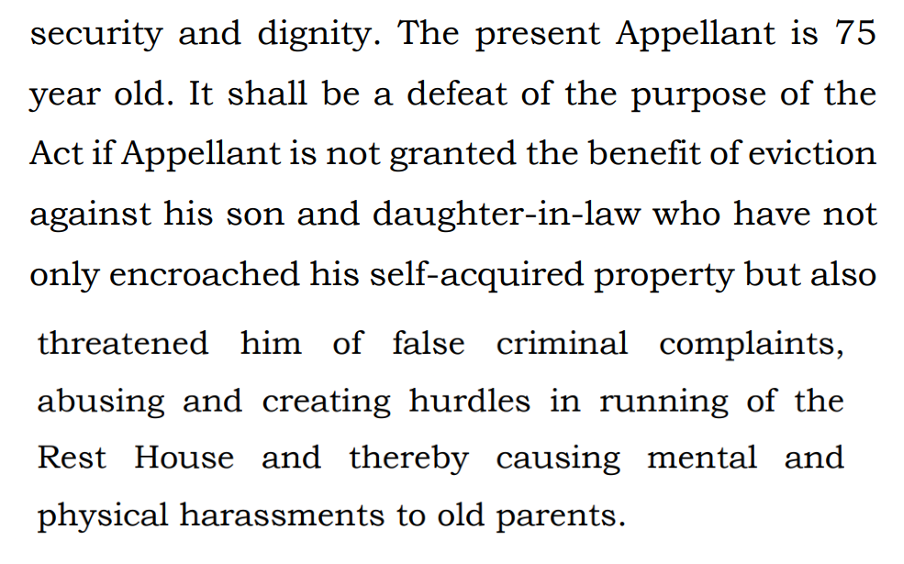
Accordingly, the order of the Division Bench is set aside, and that of the Maintenance Tribunal is restored.
Kerala High Court: Grants bail to 91-year old accused of stabbing his 88-year old wife
The Kerala High Court, in Thevan vs. State of Kerala, granted bail to a 91-year-old husband accused of stabbing his 88-year-old wife, reiterating that age does not dim the light of love, it only makes it shine brighter. The bail application was filed under Section 483 of the Bharatiya Nagarik Suraksha Sanhita (BNSS), 2023, while the offences were registered under Sections 118(1) and 109(1) of the Bharatiya Nyaya Sanhita (BNS), 2023.
According to the prosecution, Thevan, aged 91, was living with his wife Kunjali, aged 88. A domestic quarrel arose when Kunjali allegedly accused Thevan of having illicit relationships with other women. In a moment of frustration, Thevan allegedly attacked her with a knife on 21 March 2025, causing serious injuries. He was arrested on the same day and had been in custody since.
The Court, after hearing both parties, took note of the age and long-standing relationship between the couple. Emphasizing the emotional and social realities of old age, and in a rare expression of judicial compassion, the Court remarked that “Let Thevan aged 91 live happily with Kunjali, his wife aged 88 in their old age… A great marriage is not when the ‘perfect couple’ comes together, it is when the imperfect couple learns to enjoy their differences.”
The judge invoked poetic lines and reminded both parties of the importance of companionship in the twilight years- “As we grow older, our love for each other only deepens… Let Thevan and Kunjali complete their innings of life with happiness.”
The Court allowed the bail application with the following conditions:
- The petitioner shall be released on bail upon executing a bond of ₹50,000 with two solvent sureties of like amount.
- The petitioner shall cooperate with the investigation and appear before the Investigating Officer as and when required.
Punjab and Haryana High Court: Basic amenities such as electricity the fundamental right to life as enshrined under Article 21
In Jaishree Bagga vs. State of Punjab and Others, the Punjab and Haryana High Court struck down a notification issued by the Punjab Government that had imposed a cut-off date for providing electricity connections to plots in unauthorized colonies. The Court held that access to basic civic amenities, including electricity, is a fundamental right and cannot be arbitrarily denied.
The case arose from a petition filed by a resident of Silvar Estate in Hoshiarpur, who had lawfully purchased land, obtained building plan sanctions, and initially secured a temporary electricity connection on 28 March 2022. Despite complying with all procedural requirements, her electricity connection was abruptly disconnected in April 2024. Her subsequent efforts to obtain a permanent connection were rejected by authorities on the basis of the cut-off date introduced in the November 2024 notification derived from the powers conferred under Punjab Laws (Special Provisions) Act, 2013
As per Clause 2.0 of the impugned notification, only those individuals who had executed registered documents or agreements related to their plots on or before 31 July 2024 were eligible to obtain electricity connections without needing a No Objection Certificate (NOC) from the Department of Housing and Urban Development. Those seeking registration between 1 December 2024 and 28 February 2025 were still required to obtain an NOC even if they already held valid and registered property documents.
The petitioner contended that the clause effectively excluded bona fide plot owners who had completed valid transactions and complied with legal procedures from accessing essential services, without any rational justification. The Court agreed, observing that the clause imposed an unreasonable classification that lacked intelligible differentia and had no nexus to the stated objective of regularizing unauthorized colonies.
The Court found that there was no defect in the petitioner’s ownership, nor in her sanctioned construction. It further noted that the authorities had no legal basis to demand re-registration of already registered sale deeds and that the power to rescind or annul such deeds vested only with civil courts.
The Court further remarked that the prescription of the cut-off date snatches or truncates the rights of vendees who had earlier acquired a perfect title over the disputed plots. Requiring such persons to re-register their plots is legally untenable and administratively arbitrary. Emphasizing the fundamental nature of access to electricity and other basic amenities, the Court held that denying the petitioner a permanent connection infringed her right to live with dignity. The right to life under Article 21 of the Constitution would otherwise be denied if this Court upholds the arbitrary and discriminatory cut-off date. The notification’s clause was declared redundant and legally unsustainable, and the Court quashed Clause 2.0 of the notification and the corresponding circular dated 04 December 2024.
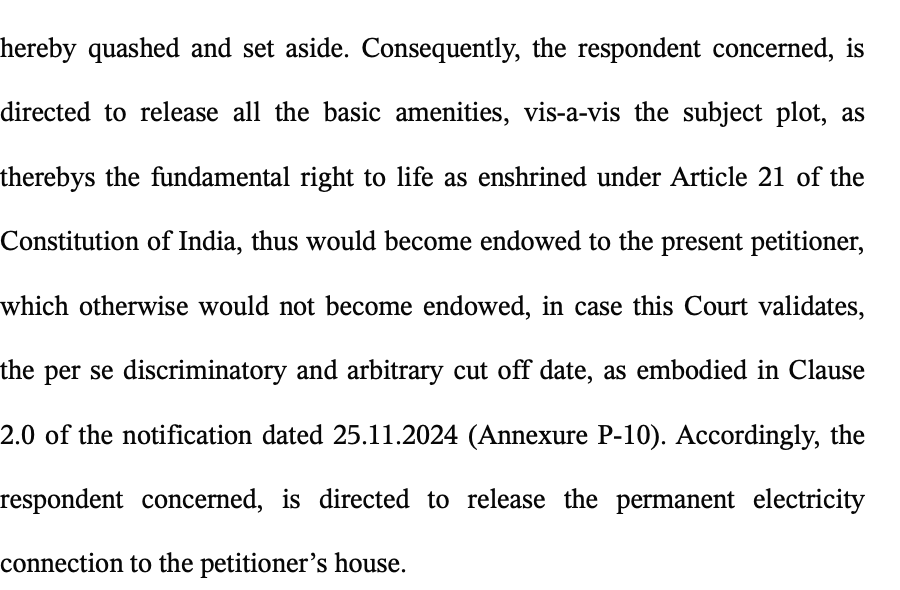
Accordingly, the respondent concerned was directed to release all the basic amenities, including the permanent electricity connection, to the petitioner’s house.


